August 16th sees the return of the frighteningly prolific former Million Dead frontman and now fully fledged superstar Frank Turner. This time around, he is joined by a new band made up entirely of female performers, to tell the true tales of a whole host of women from history whose stories “should have already been told.” Granted, there are also slightly better known ladies included, such as Dutch exotic dancer turned German spy, Mata Hari, but mostly these are women forgotten in the midst of time, and it’s a joy to hear them brought back to life here by Turner. I caught up with him to talk past, present and popularity…
God Is In The Tv: Congratulations on No Man’s Land. It’s exciting, fun and fascinating in equal measure. I wasn’t particularly interested in history at school, but then my son started reading and watching Horrible Histories and now I’m gripped! I feel like your album is like an extension of that. Did such an idea ever cross your mind?
Frank Turner: Not particularly, although I don’t have kids, so my viewing of Horrible Histories has been kind of limited, but what I HAVE seen, I’ve really enjoyed it – it’s very humorous and does seem to be reasonably coherent and in-depth. My own interest in history comes largely from one particular teacher I had, who just made it all so exciting to me. I often wonder how I’d have felt about it, if it hadn’t been for that.
The way it’s told is important, I guess. For example, I’m reading Neil Gaiman’s retelling of stories from Norse mythology at the moment, and he really makes the characters come to life. In fact, I’d love to hear you do something about that…
Frank: Ok, well I’ll add it to the ‘possible next projects’ list then!
Ha ha. Great. For No Man’s Land, when did you first come up with the idea of using these stories as the basis for an album?
Frank: Well, the story goes that I actually wrote this album before Be More Kind, but then the world went completely nuts in 2016, and I felt like I wanted to respond to that more directly and more immediately. So while I’m still very pleased with – and proud of – that album, I eventually came back to plan A. Prior to that, after I’d released two albums about break-ups, I felt like both me and my audience were probably growing a little tired of records that were essentially me feeling sorry for myself!
You’ve been doing podcasts to give further insight into these women’s stories. How important is it for people to listen to those, in terms of the enjoyment factor?
Frank: Well obviously what’s MOST important is that it stands up as an album on its own, but hopefully the podcasts can enhance the experience. It’s a real challenge to sum up a real person’s life in three and a half minutes, but then it struck me that instead of going too in-depth historically, a better idea would be to dig for the real stories of emotion and humanity that lie beneath the surface. So the world of podcasting beckoned, so that we could tell the stories in more detail. And we have some amazing, knowledgeable guests. My favourite bits of those podcasts are where I find out I’m wrong about something! For instance, for the song about Dora Hand, I’d always believed – and been led to believe – that she had this huge funeral when she died, with people coming from miles away to mourn, so I say that in the song, but then we had an expert from Boot Hill museum in Dodge City, on the podcast, who would know more than anyone else about this, and they said there was absolutely no evidence anywhere to support this claim! So yeah, I’m definitely continuing to learn, and I love it!
Do you feel a kind of kinship with the women you’ve written about here?
Frank: In some cases, to an extent, but I don’t want to come across as overbearing on things like that. It would be somewhat crass for me to suggest that I had the ability to feel what those women felt – it’s not quite THAT! But I did have to try to kind of inhabit a viewpoint, and attempt to imagine what it was like to be in their shoes, to the best of my ability. I’m happy with the results anyway and I hope other people like it too.
And they do, including some high profile artists like Bruce Springsteen, who has said he is a big fan of yours. Even more impressively for me, is that you’ve performed on stage with my favourite band of the last twenty years, The Hold Steady…
Frank: Well we’re totally on the same page there! I certainly put the Springsteen quote on my CV and left it on my website for a long, long, time! It’s funny, I was playing in Boston, and sitting backstage with Cory Branan and Craig Finn, two of the greatest songwriters ever in my book, and there I am, just shooting the shit with them, and I thought “I’m the one headlining! How can this be?!!!” I was definitely the junior, as far as I was concerned.
Do you find yourself having to pinch yourself sometimes? I mean, no disrespect to Million Dead, who were a fine band in their own right, but I don’t think many of us, at that point in your career, would have predicted you would go on to be QUITE so successful…
Frank: Neither would I! And yes I do pinch myself everyday. I hope I never have to STOP pinching myself. You know, I’m still expecting that knock on the door from the reality police, or that I’m going to wake up one day and realise I’m still playing gigs at The Joiners. I am so grateful to my fans and everyone else who helped put me in the position I am, I almost feel guilty about it sometimes!
Do you EVER find yourself craving the simpler days of Winchester and small gigs at The Railway?
Frank: Oh sometimes, absolutely. The difference is it’s quite easy to exist in a kind of ‘underground bubble’ if you like, because you know the people who are at your gigs are AAARGH!
They’re what?
Frank: Sorry, the cat suddenly leapt at me while I was answering. Bloody cat destroyed my laptop on Friday too! She’s great though. No, what I was saying is that those people at your early gigs are genuinely people who like you and your music; they are there to support you. But once you break into the mainstream, you’re being exposed to an unfiltered audience – people who only go to two gigs a year, or they just like you because of one song they heard on the radio, and won’t necessarily support you beyond that. You become a target for people to take shots at, so yes there ARE times when I think about the simpler days, but look, the bottom line is: I am master of my own fate, and I get the chance to ply my trade all around the world, where I can hang out with cool people like Craig Finn and Cody Branan. So I’m not complaining! Actually if there was one point in time I WOULD enjoy going back to, it’s the moment we first started to break into the ‘big time’. That was just so exciting.
Anything else on your bucket list?
Yes! So many other countries I want to play in. It pisses me off that I still haven’t played in South America yet. And although I’ve written two books already, they were both about me! I’d like to write a serious history book. For now though, it’s all about No Man’s Land. I’m my own harshest critic, but I’m really pleased with it because it’s unusual and different to anything I’ve ever done before.
At this point I wished Frank well and we wrapped up the interview, telling him I would no doubt catch him on tour later this year. I also mentioned two books I was hoping to get published myself, which I co-wrote with a friend of mine – one of nonsense stories, and one in a similar vein which focuses on the dumbest detective you could ever imagine. He said he’d love to read them, and I said I’d love to hear his thoughts, even if he thought they were shit, so I sent one story to his PR, who said she would forward it to his management. I haven’t heard back from Frank. Knowing what a nice guy he is, I’m guessing he thinks it’s shit but is too polite to say!




